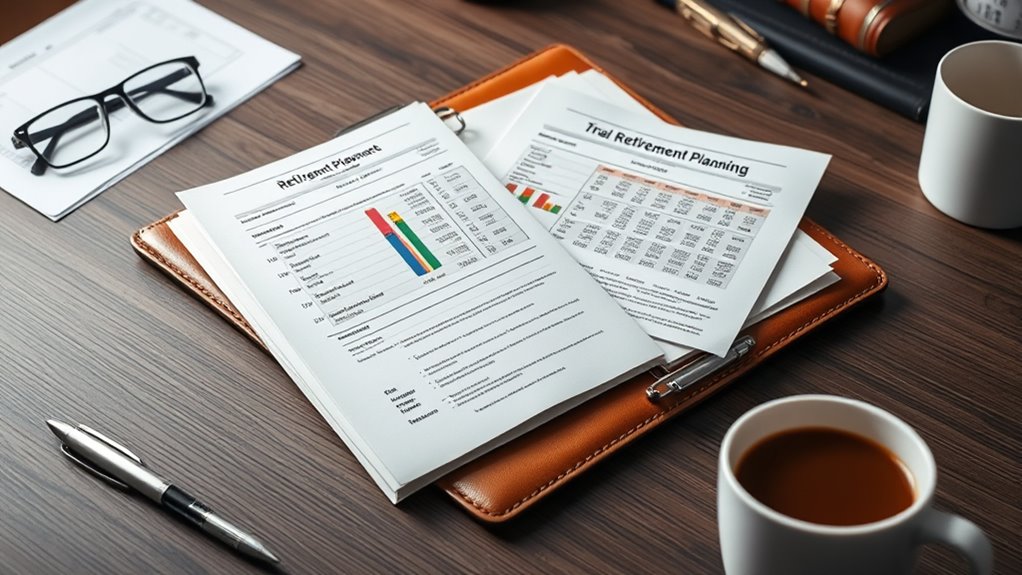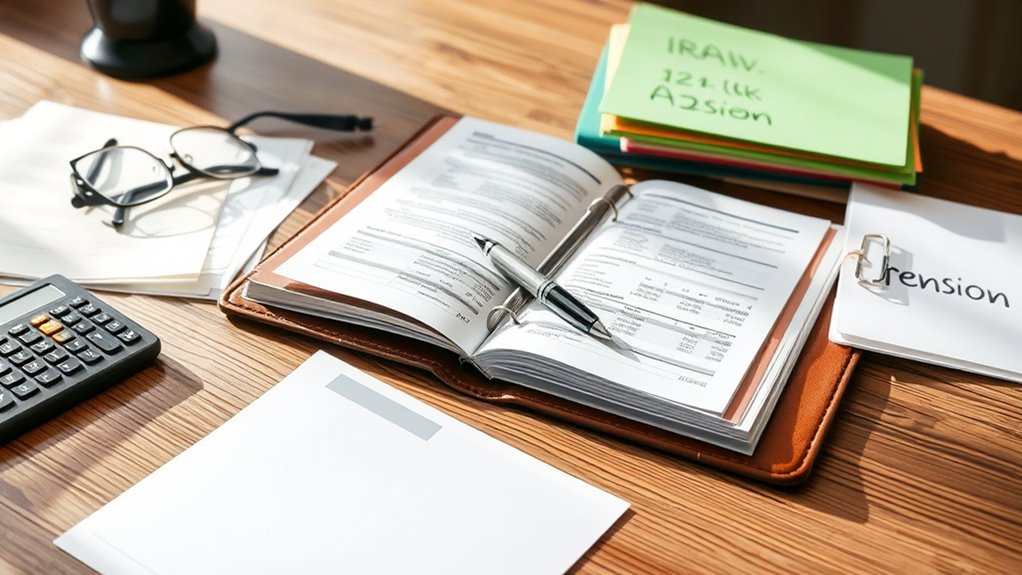Having all your retirement planning documents, like IRAs, 401(k)s, and pension records, organized is vital for a smooth shift when you retire. These records help you understand your assets’ value, manage beneficiary designations, and guarantee your estate plans stay current. Proper documentation also prevents surprises for your heirs and simplifies estate settlement. Staying on top of these details ensures your assets are aligned with your goals—continue to explore how to keep everything in order.
Key Takeaways
- Keep detailed records of IRA, 401(k), and pension account statements for accurate estate valuation.
- Regularly review and update beneficiary designations to align with estate planning goals.
- Organize all retirement account documentation, including account numbers and contact info, for easy access.
- Understand specific rules, RMDs, and tax implications for each retirement account type.
- Include retirement assets in estate valuation to ensure proper transfer and minimize disputes.

Are you prepared for a smooth retirement? One of the most crucial steps is ensuring your retirement planning documents are in order. This means understanding your IRAs, 401(k)s, and pension records, as well as how they fit into your overall estate planning. When it comes to estate valuation, it’s essential to know the current value of all your assets, including retirement accounts. This helps you see the full picture of your estate and ensures that your beneficiary designations are aligned with your wishes. Proper estate valuation also helps prevent surprises for your heirs and simplifies the probate process.
You should review your beneficiary designations regularly, especially after major life events like marriage, divorce, or the death of a loved one. These designations determine who will receive your retirement funds and can override your will, so it’s vital they are accurate and up to date. Forgetting to update these can lead to unintended beneficiaries, potentially causing conflicts or complicating estate settlement. Make sure your beneficiary designations are consistent with your overall estate plan, and keep copies of these designations for your records.
Your IRA, 401(k), and pension records serve as the backbone of your retirement savings strategy. They are often the most significant assets you’ll leave behind, so maintaining clear documentation is key. Keep all statements, account numbers, and contact information in an organized file. This simplifies the process for your beneficiaries and executors when the time comes. It’s also wise to understand the specific rules governing each type of account, including required minimum distributions and tax implications, so you can plan accordingly. Regularly reviewing your retirement accounts’ valuation is essential, especially since market fluctuations can impact their current worth.
In addition, verify your estate valuation includes your retirement accounts, as their value fluctuates over time. This can influence your estate’s overall size and affect how much estate tax may be due. By regularly reviewing these records and updating your estate plan, you help make certain your assets are transferred smoothly and according to your wishes, minimizing stress for your loved ones. Proper documentation also provides clarity, reducing the likelihood of disputes among heirs.
Frequently Asked Questions
How Often Should I Review My Retirement Planning Documents?
You should review your retirement planning documents at least once a year to stay on top of your investment strategies and guarantee your beneficiary updates are current. Life changes, like a new job or marriage, can affect your plans, so regular reviews help you adjust accordingly. By doing this annually, you keep your retirement goals aligned with your current circumstances, maximizing your financial security for the future.
Can I Access My Retirement Accounts Internationally?
Yes, you can access your retirement accounts internationally, but it depends on your provider’s policies and international access options. Confirm your account has strong security measures in place to protect against unauthorized access. Use secure Wi-Fi networks, enable two-factor authentication, and notify your provider of international travel to avoid access issues. Regularly check your account activity to maintain account security while managing your retirement accounts abroad.
What Are the Penalties for Early Withdrawal?
If you take an early withdrawal from your retirement account, you’ll face early withdrawal penalties, usually 10% of the amount you withdraw. Additionally, you’ll incur tax implications, as the withdrawn funds are taxed as ordinary income. These penalties and taxes can markedly reduce your savings, so it’s wise to explore other options before making an early withdrawal. Always consult a financial advisor to understand your specific situation.
How Do I Choose the Right Retirement Account?
They say, “Don’t put all your eggs in one basket,” so choose your retirement account carefully. To pick the right one, consider your investment options, tax advantages, and contribution limits. If you want flexibility, an IRA might suit you. For employer-sponsored plans, a 401(k) could be better. Assess your goals, compare features, and select an account that aligns with your financial future.
Are There Tax Implications When Transferring Retirement Funds?
When you transfer retirement funds, there can be taxable events if you don’t follow the proper rollover procedures, meaning you might owe taxes on the amount. Additionally, if you miss the 60-day transfer window, you could face transfer penalties. To avoid these issues, make sure you do a direct rollover or trustee-to-trustee transfer, and complete it within the required timeframe. This way, you keep your transfer tax- and penalty-free.
Conclusion
Think of your retirement documents as the map that guides your financial journey. With IRAs, 401(k)s, and pension records in hand, you’re steering toward a secure horizon. Keep these records organized like treasures in a chest—ready to unseal your future peace of mind. The more you prepare now, the clearer your path will be when it’s time to step into the sunset. Your golden years deserve a well-charted course—start organizing today.








